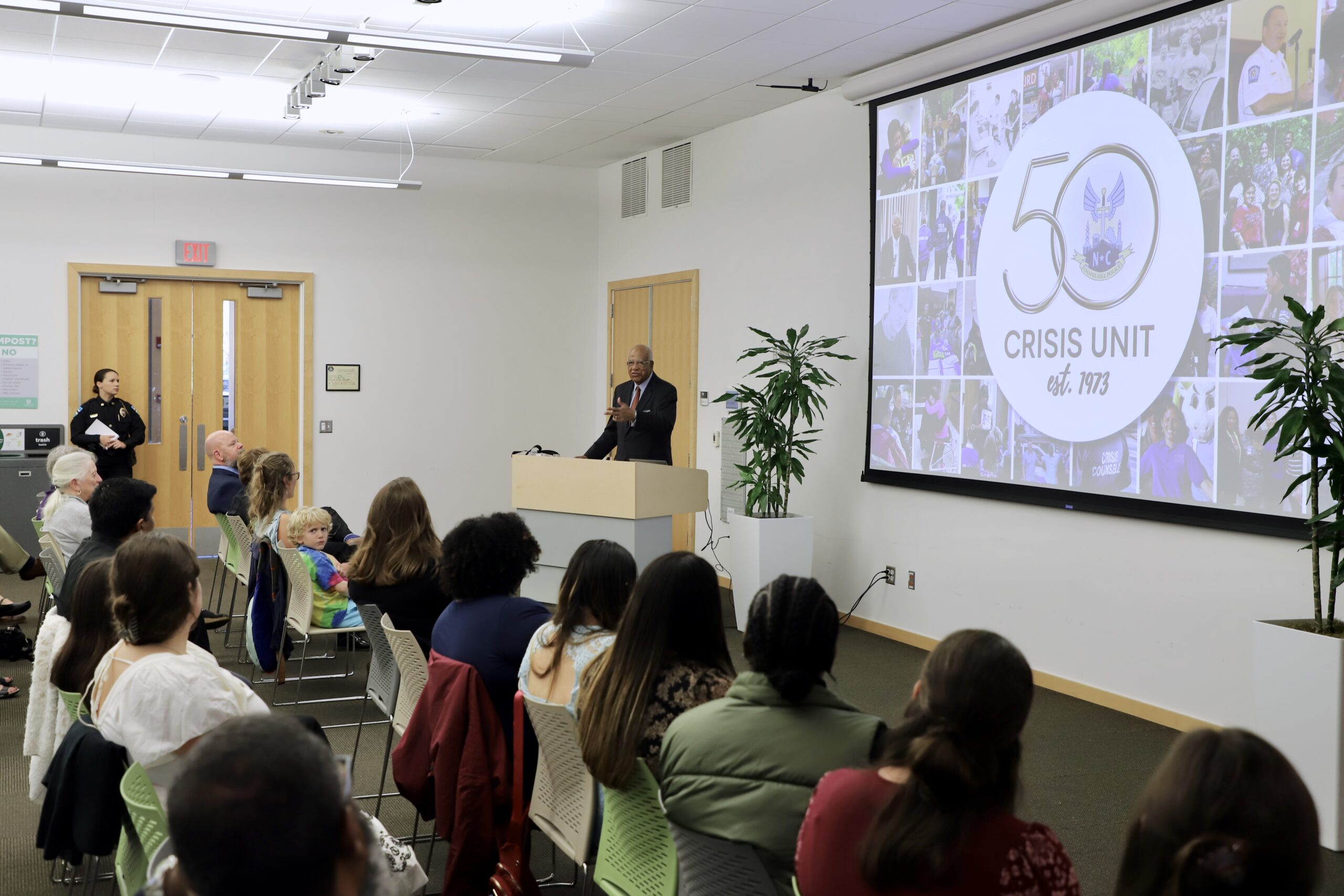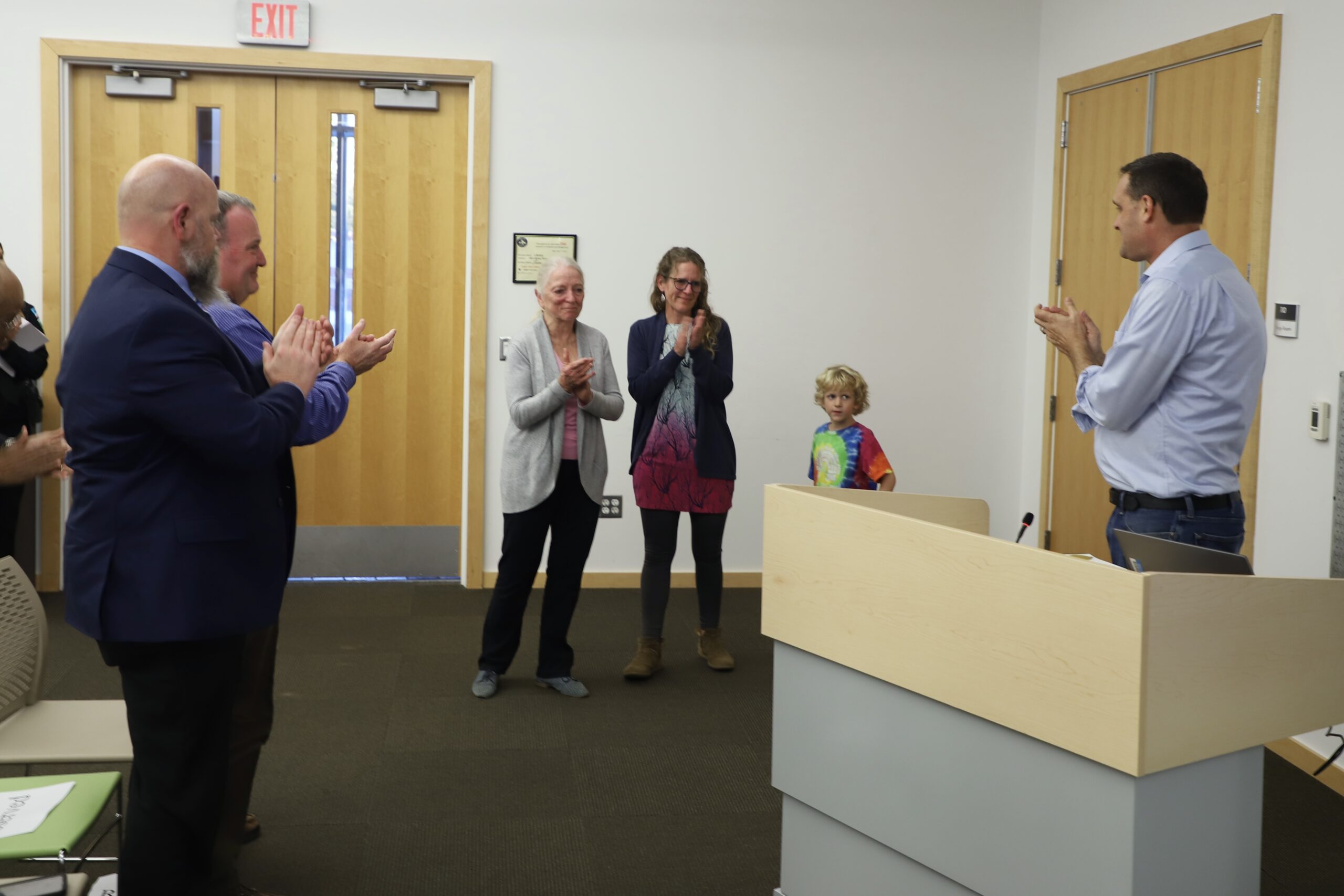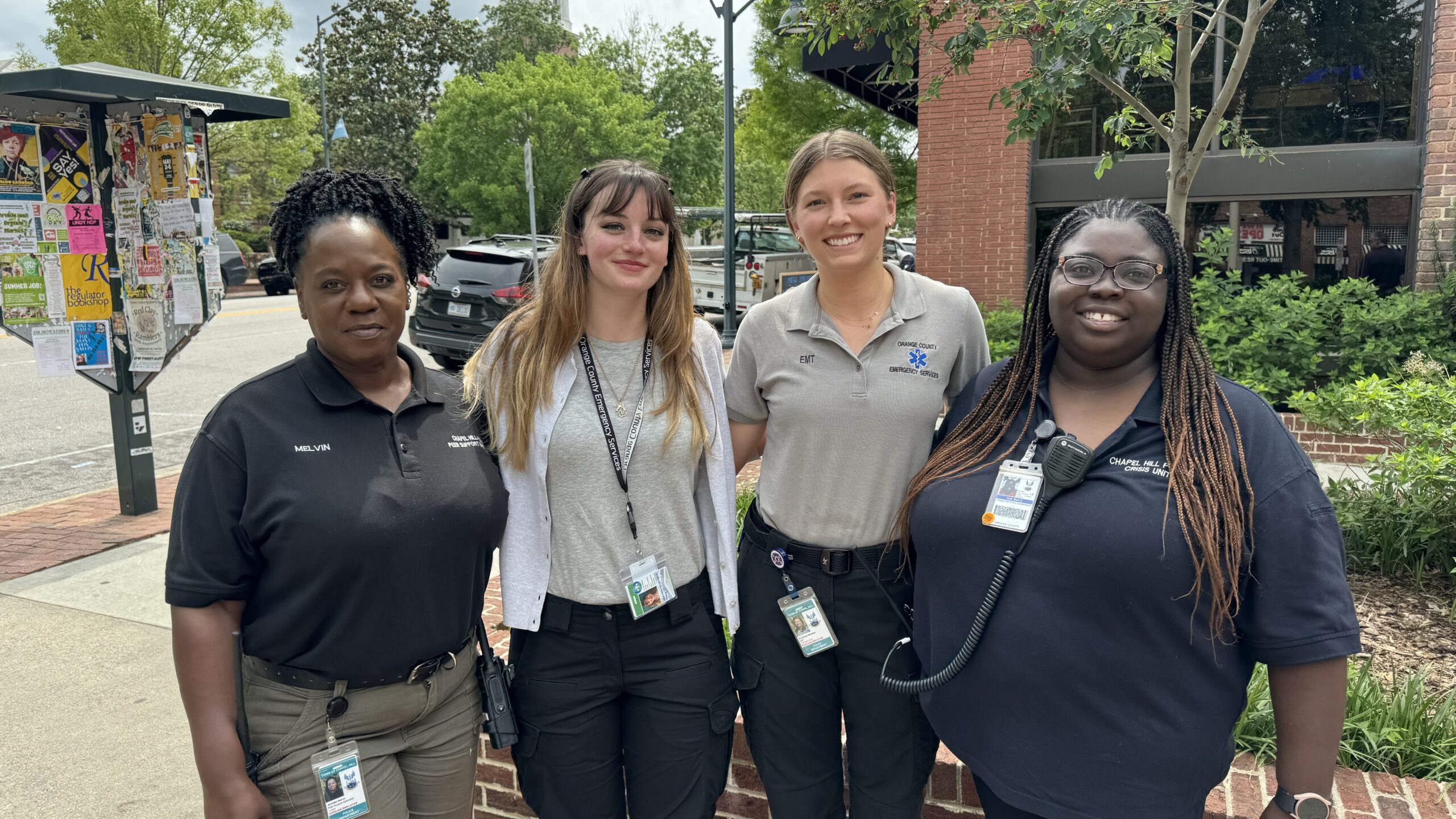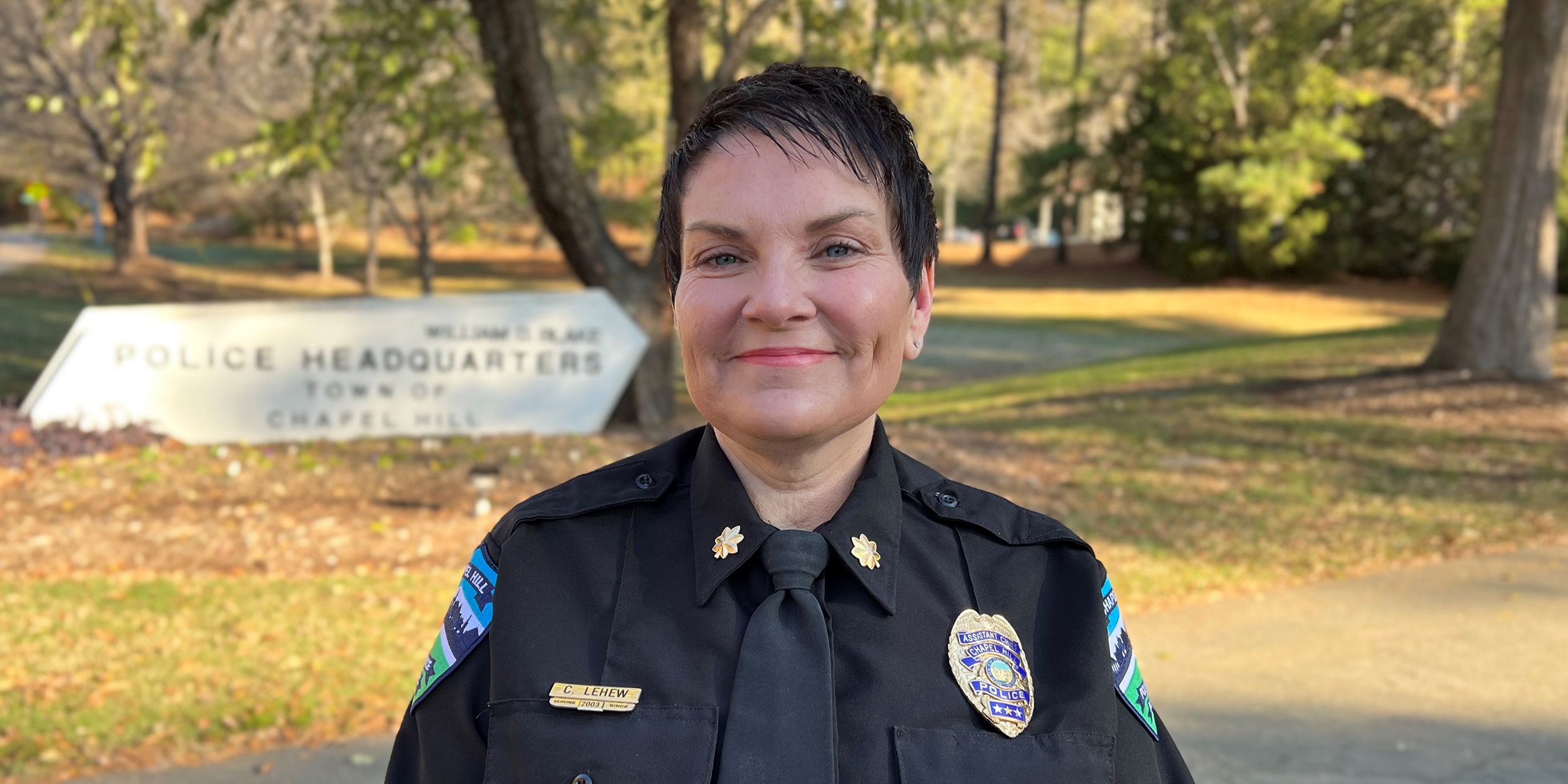An event room in the Chapel Hill Public Library filled with greetings and conversations among former co-workers as they reunited last Thursday for the 50th anniversary party of the Chapel Hill Police Department’s Crisis Unit. Current and former members of the initiative, as well as other Chapel Hill Police representatives and family, swapped stories of working alongside each other and trying to provide positive outcomes for the community.
Chapel Hill Police Department’s Crisis Unit has long been celebrated as an alternate way to respond to emergencies that may not need a law enforcement response. The co-responding program sends out social workers with officers during calls to see if their skills would be better for the incident – whether it’s a mental health crisis, a runaway child, or simply treating victims of a crime.
Chapel Hill Police Chief Celisa Lehew began Thursday’s program, which featured several speakers honoring the Crisis Unit’s history and ongoing work.
“It’s an important moment,” she said, “not merely to reflect on our past, but to plan for the future and recommit ourselves to the ideals we implemented 50 years ago: the powerful example of how community safety and community health can work together to improve our community we live in.”
As they respond to 911 calls with Chapel Hill Police officers, members of the Crisis Unit determine on-scene whether their social work skills are needed. In action, they try to provide safe environments for people experiencing crises – in whatever form that may take – and connect them to the necessary resources to divert them from unnecessarily entering the criminal justice system.
When the program began in 1973, Chapel Hill Mayor Howard Lee was driven by resident feedback that police were responding very often to domestic disputes in the town’s Black neighborhoods. Lee said he worked with Chapel Hill Police Chief Bill Blake to craft the plan of putting a social worker in the police department and having them handle domestic issues.

Former Chapel Hill Mayor Howard Lee speaks at the Chapel Hill Police Department’s 50th anniversary celebration for its Crisis Unit. Lee was mayor of the town when the program began in 1973. (Photo via Alex Carrasquillo/Town of Chapel Hill.)

The current members of Chapel Hill Police’s Crisis Unit pose for a photo while being recognized during the ceremony. (Photo via Alex Carrasquillo/Town of Chapel Hill.)
Howard said despite the doubt that came from other local leaders and social work professionals at that time, the program took root and flourished based on the effort of those in the Crisis Unit. During the 50th anniversary party, he said he was “flattered” to speak about the program but credited those who went on those thousands of calls as the ones who made it successful.
“You have influenced the thinking and actions of countless members of municipalities throughout America who, today, are embracing this concept,” said Lee. “My friends in Raleigh ridiculed us when we first implemented this program, and some friends in Durham. They are now duplicating – coming on late! – and implementing the program. So, thank you.”
One of the integral members of the Crisis Unit was Jim Huegerich. Having spent more than four decades as part of the team, Huegerich served as a mentor to dozens of people who worked as part of the initiative. He died in February 2022 after a battle with leukemia, and many attendees on Thursday said the celebration of the Crisis Unit didn’t feel right without one of its formative figures.
To honor Huegerich and his dedication to the effort, state Sen. Graig Meyer – who himself is an alumnus of the Crisis Unit and worked under Jim – awarded the Huegerich family with the highest honor given in North Carolina: the Order of the Long Leaf Pine.

Members of Jim Huegerich’s family are applauded after Sen. Graig Meyer unveiled a certificate for the Order of the Long Leaf Pine. (Photo via Alex Carrasquillo/Town of Chapel Hill.)
Meyer also recounted going out on his first call with the unit and Huegerich being there when he returned to ask him how it went.
“He listened to everything that happened,” said Meyer, “he asked me some very good, social worker questions, and then he said, ‘You did good.’ I don’t know if I’ve ever had a supervisor who was ever as affirmative to me as Jim Huegerich always was. No matter what the situation was, no matter what we had encountered, no matter what had gone wrong… Jim was always there to affirm, to support, and to make sure that we could take whatever the next call was that came to us.”
To honor both its employees of the past and those of the present, Chief Lehew called up different cohorts of the Crisis Unit and gifted them a town challenge coin, specially designed for the 50th anniversary. During their recognition, Unit Supervisor Sarah Belcher offered praise and encouragement to her current team.
“You don’t rest on the 50-year legacy of this unit, you keep pushing it,” she said to the group. “You constantly look for ways to adapt and innovate, to meet the needs of our community. You’re always pushing this work forward. I thank you from the bottom of my heart for your unconditional dedication, commitment, hard work, and everything you do day-in and day-out as a team.”
Soon, the Crisis Unit will be scaling up its work. Beyond its co-response duties, the unit is launching a pilot program with Orange County to have a free-standing trio of responders working in tandem with a call diversion program.
“The mobile response team will be a crisis counselor, peer support specialist, and a community EMT,” said Belcher, “that will respond to calls that don’t necessarily need a law enforcement response. The crisis counselor that’s going into the 911 Call Center will triage those calls and try to help address some of their needs over the phone or get them connected to the mobile team. We’re really excited about it.”
To learn more about the Chapel Hill Police Department’s Crisis Unit, visit the town government’s website.
Photo via Alex Carrasquillo/Town of Chapel Hill.
Chapelboro.com does not charge subscription fees, and you can directly support our efforts in local journalism here. Want more of what you see on Chapelboro? Let us bring free local news and community information to you by signing up for our biweekly newsletter.










